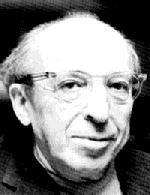

Copland's music, after his juvenalia, falls into three large periods. In the first two, he concerns himself with, among other things, trying to find a serious style which sounds American, rather than European. His main teacher, Nadia Boulanger, encouraged him in this, usually pointing out (to her) odd rhythms in his work. Copland had not noticed them before, because they were part of him. As Leonard Bernstein noted, they were the rhythms of someone who had grown up with jazz and American pop, although not necessarily jazz rhythms. As a young man in his 20s, he composes a ballet "Grohg" (later reworked as the "Dance Symphony") to an Expressionist libretto by the theater critic Harold Clurman. The rhythms in the faster sections gave some very well-known European conductors fits. Again, they weren't precisely the jazz of the time, but they would have fit right into be-bop. In his first period during the 1920s, he tries out his own brand of symphonic jazz in such works as "Music for the Theater" and the massive "Piano Concerto". However, he soon gives it up because he feels it emotionally "limited" to either blues or "snappy numbers." Never mind that his own example disproves this. He then starts casting about for something else, and the works of this time betray to some extent a lack of artistic direction, even as they show an increase in technical skill. This culminates in the highly Stravinskian"Short Symphony" and the craggy "Piano Variations", two masterpieces in which I can find not a single wasted note.
To a great extent, Copland seems the product of two milieus: Paris and the United States. The States give him something not always at the front of his conscious mind - an imaginative landscape of expression, more than anything else. Along with Gershwin, his music conveys the energy of New York and the visual power of skyscrapers (the folk-like Copland comes later). Paris gives him a Stravinskian orientation and technique, as well as an elegance of expression - the ability to say the most with the fewest notes. The same can also be said of his colleagues and fellow Boulangerian alumni Thomson and Piston, although each has his own musical identity.
Shortly after this transitional period, the artistic populism of the thirties begins to affect Copland's artistic direction. He wants his work to reach people who don't normally go in for Horrid Modern Music. He writes for popular venues: "Outdoor Overture" for high-school orchestra, the "school opera" "The Second Hurricane", and music for theater, ballet, and films. His collaborators, also affected by 30s populism, choose well-known American mythic subjects, and Copland responds (with the help of Virgil Thomson) by simplifying his musical materials and incorporating folk influences. This results in his most popular works: the ballets "Billy the Kid", "Rodeo" (incidentally, pronounced ROH-dio by the composer), the incidental music for Irwin Shaw's play "Quiet City", and the film scores "Our Town" and "The Red Pony." The period also produced the "tourista postcards" of "El Salon México" and "Danzon Cubano", a clarinet concerto for Benny Goodman, the full-length opera "The Tender Land," "Fanfare for the Common Man", "Lincoln Portrait" for speaker and orchestra, the "Old American Songs", Symphony No. 3, and his mega-hit "Appalachian Spring".
In addition to all of the above, he became an impressario of modern-music concerts, established the composition department at Tanglewood, helped publish modern American works, found patrons for young, promising composers, wrote and lectured on a wide range of modern music (many of these essays became landmarks of musical criticism), and even managed to produce a music-appreciation book for the general reader, "What to Listen for in Music". He assiduously attended the major modern music festivals, always on the lookout for something new. Although very influenced by the modern French school, he listened perceptively to the Schoenberg camp, especially Webern, and characteristically tried to give others a way in. He probably had absorbed as much as anyone on the music of Europe and the Americas. He opened up North Americans to such composers as Chávez, Revueltas, and Ginastera. He excelled at spotting new talent: Schuman, Diamond, Herrmann, Mennin, Bernstein, and Del Tredici, among others.
In the 1950s, Copland felt that his American Pastoral idiom had lost its interest for him. He turned to serialism to recharge and came up with serial Copland. The new methods don't turn him into Schoenberg. One can still identify these works as coming from Copland and remain among my favorite pieces in his output: the "Piano Quartet", "Music for a Great City", "Connotations" (not, strictly speaking, serial), and "Inscapes", his last major orchestral work.
Copland, to all intents and purposes, retired from composition in 1965, although short pieces occasionally came from the shop. This was a combination of the public's rejection of his latest works (including "Inscapes", one of the great postwar American scores) and of the Oedipal acting out of younger composers, who essentially ignored him. He decided to conduct, specializing in his own scores, to a great extent to make money (even with his popularity, he was hardly raking in bucks from composition at this point) and had a nice, lucrative career. The "American" works keep their hold in the popular repertory, and at least he lived to see the young Turks come back for a long, appreciative look.
Copland is also known as a writer and teacher as well as a composer. Three books dealing with music in general, but of great importance to the understanding of modern music, have come from his pen.